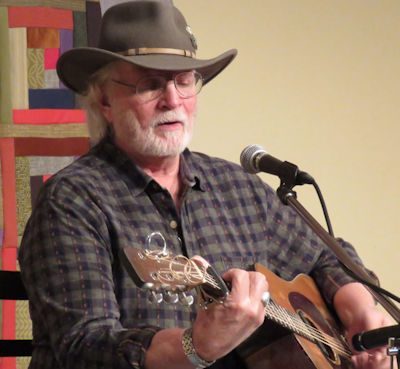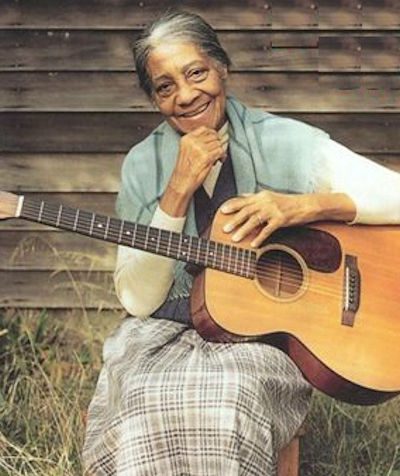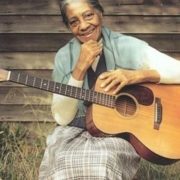BILL STAINES IN CONCERT AT CALTECH
BILL STAINES IN CONCERT AT CALTECH
Beckman Institute Auditorium
The Pasadena Folk Music Society
October 20, 2018, 8:00pm
 New Hampshire has only one of everything wrote Robert Frost, in the title poem to his first Pulitzer Prize-winning collection published 95 years ago in October, 1923—and it’s not for sale. She had one president, one Daniel Webster, one real reformer, only one witch~ and so on. She has only one folk singer and his name is Bill Staines.
New Hampshire has only one of everything wrote Robert Frost, in the title poem to his first Pulitzer Prize-winning collection published 95 years ago in October, 1923—and it’s not for sale. She had one president, one Daniel Webster, one real reformer, only one witch~ and so on. She has only one folk singer and his name is Bill Staines.
Robert Frost, Emily Dickinson, Bill Staines—these are our great New England poets. Staines was born in Medford, Massachusetts February 7, 1947 and lives in Dover, New Hampshire—Frost’s farm was in Derry—not far from Sandy and Caroline Paton’s Folk-Legacy Records in Sharon, Connecticut, the label for some of his early albums. He’s also downwind from Burlington, Vermont, home of Philo Records, the label for some of his middle period albums. There’s a certain kind of off-center quality to their work—“Tell all the truth—but tell it slant,” wrote Emily Dickinson. So when Staines wants to reference the current political climate in the context of one of his songs that has gotten a lot of requests lately, he doesn’t mention any names—he brings it into his on-going flow of conversation surrounding his great songs by noting that it has all happened during the “the past twenty months.”
I keep wondering, “Why twenty months?” That’s too specific to be incidental.
And then I looked at the calendar: October 20, the Saturday night of his concert—and it was the first time in the fifty years he has been performing modern folk music—that he was sponsored by the Pasadena Folk Music Society. It took a long time—and he gave a great two-hour concert of his songs that people in folk clubs across the country have been singing all this time, songs like the opening Crossing the Water, All God’s Critters Gotta Place in the Choir (which ended the first set), The Roseville Fair (one of the great love songs of our time), Faith in Man (a secular hymn—as opposed to faith in God)—and his classic paean to nature, River (that ended the concert).
So I count backwards from October 20, 2018—and twenty months to the day takes us inexorably back to January 20, 2017—aha!—Inauguration Day. Bridges (1989) is a song about building bridges—as opposed to the White House obsession with building walls:
Bridges by Bill Staines
There are bridges, bridges in the sky,
They are shining in the sun,
They are stone and steel and wood and wire,
They can change two things to one.
They are languages and letters,
They are poetry and awe,
They are love and understanding,
And they’re better than a wall.
“Something there is that doesn’t love a wall,” wrote Staines’ spiritual forebear Frost. That’s Staines’ way of also heeding Dickinson’s Amherst, Massachusetts counsel, “Tell all the truth, but tell it slant.” As he always has, he writes songs to bring people together—we all have, in his musical metaphor “A Place in the Choir.” It’s a parable for his entire canon:
Some sing low,some sing higher,
Some sing out loud on the telephone wire,
Some just clap their hands, or paws, or anything they got now.
I heard it live for the first time more than thirty years ago at Elaine and Clark Weissman’s House Concert for CTMS—one of their very first concerts—Elaine and I shared a secret bond in discovering that we both had Staines’ rare first album—a private pressing—much like another New Englander—H.D. Thoreau’s—self-published Walden (“…in my library, more than 800 of which I wrote myself.”)
And yet Bill Staines’ imagination is limitless, and his dedication to the art and craft of being a folk singer-songwriter has literally taken him all over the map. His most recent collection of songs is called The Third Million Miles—having already released the First Million Miles Volumes One and Two, and the Second Million Miles—a kind of “Greatest Hits 1, 2 and 3.” But each volume has some extra new songs as well—and he performed a couple new songs from this collection—one a tribute to Beat pioneer Jack Kerouac, using his title Dharma Bums. Lots of folk singers write songs about bums, and about traveling, and highways—it’s a staple of the genre; but only Bill Staines writes one about Kerouac’s Dharma Bums—what a wonderful tribute to a modern prose master. His utterly original titles for these collections reflect the hard traveling reality that he actually drives to his bookings—70,000 miles a year. When I get frustrated at the “long drive” to Pasadena along the 134 freeway I thus stop myself with the thought that Staines drove here from New Hampshire—on his 2018 tour. “Shame on me,” I reflected—“keep driving!”
Many of Bill Staines’ tongue-in-cheek wonderful stories—for he is a storyteller as well as a folk singer–come from things he has observed with his own eyes along the highways and bi-ways of our land. His closing words to the audience captured one of them: “Drive safely—fasten your seatbelts.” It reminds him of s bumper sticker he had seen somewhere in Ohio—“Fasten your seatbelts—It makes it harder for the aliens to suck you out of your car.” Wow—you hear that and don’t soon forget it.
In Ohio, he comes across the road sign he used to introduce another song from the show—8 Miles to Morrow. Yes, folks, there is actually a town called “Morrow,” that inspired the comic masterpiece I Want to Go To Morrow, which I first heard from the Limelighters—a delightful conundrum about a would-be traveler who asked a train depot attendant how far it was “To Morrow,” and soon concluded that he couldn’t go tomorrow—unless he left today—and so decided that he would stay right where he was—an Abbott and Costello-like word-play routine in the form of a song. How charming to hear it from a serious songwriter like Bill Staines—since it grows out of his life and sense of humor as a traveling folk singer.
That wasn’t the only song he shared by other writers. It was also quite wonderful to hear him do his beautiful rendition of Ian Tyson’s Four Strong Winds—which was inspired by Tyson hearing Bob Dylan’s Blowing In the Wind soon after it was written in 1963, and thinking to himself, “Maybe there is another song about ‘wind,’ that I could write from my own experience coming from Alberta. It worked for Bob.” Staines tells the story accompanying Tyson’s masterpiece about first hearing it on ABC’s Hootenanny sung by the Chad Mitchell Trio, but accompanied on guitar by a performer named Paul Prestopino. In the weird world of touring artists he performed it last year at Princeton University, and gave the same introduction—whereupon a member of the audience comes up after the show to introduce himself. He is the very guitarist who performed it with the Mitchell Trio a half century ago.

Staines opened the second half of the concert with a tribute to the artist whose guitar style (“Cotten picking”) he carries on and picked up without even knowing it—Elizabeth “Libba” Cotton. Like Staines, “Libba” Cotten was left-handed and played her guitar upside down—the treble strings on the top and the bass strings on the bottom—so her thumb plays the treble and her fingers play the bass. He told me during intermission that he didn’t even realize it until another musician pointed it out to him two years after he started. Most left-handed guitar players eventually find a true “left-handed guitar” strung backwards so they can play conventionally—like Paul McCartney’s left-handed bass.
But no such modern refinement was available to the twelve-year-old girl who wrote Freight Train, which Staines confided was the first song he learned to finger-pick. (It was also the first song I learned to finger-pick, from my guitar teacher at the Ash Grove—David Cohen).
That night he demonstrated her style of playing on one of his own songs from his most recent album—The Third Million Miles—Capitola Dreams—set in California for his Pasadena audience. And he played it just the way she would have played it, he pointed out with real devotion, just thumb and one-finger picking—not the two finger-picking style he usually employs. By the way, that’s the same way Lead Belly played—and Doc Watson, too. So we got to hear “Libba” Cotten’s guitar style right down to its essentials—by a folk performer who understands what it means to carry on a tradition. Bravo! Here is the opening verse and chorus:
Capitola Dreams by Bill Staines
There’s a bird outside my window, singing sweetly to my ears,
And a fogbank on the water that will slowly disappear,
There are flowers in the alley, there are sails out on the bay,
And there’s magic in the morning of this California day.
There’s a cafe on the corner, you can hear the laughter there
And it fills the early hours as the people come to share,
All the stories of the evening and the comings of the day,
Then it’s one more cup of coffee and they’re off and on their way.
Take my hand and we’ll go walking out along the quiet pier,
You can see the locals fishing and the seagulls hovering near,
Where the troubles of the heart and the ponderings of schemes,
They vanish in the visions of my Capitola dreams.
His 71 year-old hair and beard are white now, and that lean mean picking machine has put on enough extra pounds that he lets us know he is now being compared to Burl Ives. Yet his self-deprecating humor never fails him—one of his fans, he tells us cheerfully, compliments him with the less-than-welcome news that when he wants to get to sleep he just “puts on a Bill Staines’ record” and it puts him right out. Only a pro with nothing left to prove would unhesitatingly pull these stories out of his hat.
It’s a true joy to hear the concert that is the subject of what turns out to be my 100th concert review for FolkWorks—and to celebrate a great folk singer who simply sits there on stage and sings and tells stories—no light show, no backup band, no guitar tech going back and forth to change multiple instruments in different tunings with different sonic structures—just Bill Staines’ vintage Martin D-18 that has all the deep warmth of more than half a century of seasoned wood and thousands of songs that have poured through its ancient sound hole—a river of song to reflect the beautiful song “River” at the end of the evening. Thank you, Bill, and thank you to the Pasadena Folk Music Society for bringing him out here from New Hampshire.
But let Bill have the last word:
Let us build a bridge of music,
Let us cross it with a song,
Let us span another canyon,
Let us right another wrong.
Oh, and if someone should ask us,
Where we’re off and bound today,
We will tell them, “Building Bridges”,
And be off and on our way.
To see future dates on his tour, and more than 20 available albums and songbooks, see Bill Staines’ website,. Even the name of his website tells you what he stands for as a performer. How lucky we are that he is still out there touring, and logging another million miles on his sturdy old truck. He is an American original, and he’s decidedly on my shortlist of 2018’s Gatekeepers of Freedom—but most proud that his team Boston is facing LA in the World Series. And like Boston’s late great Ted Williams he lets the audience’s standing ovation take him off stage without an encore, or turning around and tipping his hat. Thanks to Nick Smith and Rex Mayreis of the Pasadena Folk Music Society for a press pass! And finally, Susan Rubinyi writes, “Nice to see you at Bill Staines’ wonderful concert–musically philosophically always an inspiration.” Amen!
Ross Altman performs Thursday evening, November 8 in Note By Note—with three other artists in Santa Clarita at The MAIN, 24266 Main St., 7:00pm Free.
Los Angeles folk singer Ross Altman has a PhD in Modern Literature from SUNY-Binghamton; belongs to Local 47 AFM; may be reached at greygoosemusic@aol.com .













